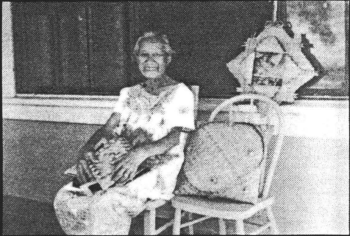Amoe Giugni

A Social History of Kona
This project, a case study of Hawaii's social history, focuses on Kona where people nurtured the development of a community and participated in and witnessed some.of the major historical developments of the islands.
Amoe Giugni, a Hawaiian-Chinese woman, was born in 1894 in Kahaluu, North Kana, Hawaii. Her father, Lee Sam, also known as Akamu by the Hawaiians, was a Chinese immigrant who owned a store and tailoring business . Her mother, Kipola, was a native Hawaiian from Kona who wove and sold lau hala products. From a young age, Amoe learned about fishing, lau hala weaving, and other Hawaiian practices. She continued to reside in Kahaluu into her late 80s.
Scope and Content Note
This interview with Amoe Giugni, conducted by Ray Kala Enos on January 13, 1981, provides a rich account of her life and experiences growing up in Kahaluu, Kona, Hawaii. The interview was conducted in Hawaiian and later translated by Ray Kala Enos. Amoe shares about her parents, her birthplace, and her childhood experiences, including her family's practices of fishing, weaving, and farming. She describes the lifestyle of the time, including how they obtained water for drinking and washing clothes, and how they traveled mainly by walking or using a donkey. She also talks about the food they ate, which included cabbage, sweet potato, and fish. Amoe also provides insights into the social and cultural dynamics of the time. She mentions the arrival of various ethnic groups, including the Chinese (Pake) and Japanese (Kepani), and their peaceful coexistence. She also discusses her work, which included making hats and leis, and her involvement in the Ka'ahumanu Society. The interview provides a valuable historical and cultural perspective, shedding light on the lifestyle, practices, and social dynamics of the Hawaiian community in the late 19th and early 20th centuries.
Interview conducted in Hawaiian (translation).
Program Note:
This interview is part of the Center for Oral History's project A Social History of Kona. Interviews from this project are available in the Center's ScholarSpace open access repository.
The Center for Oral History (COH), in the Department of Ethnic Studies at the University of Hawaiʻi at Mānoa, collects, documents, preserves and highlights the recollections of Native Hawaiians and the multi-ethnic people of Hawaiʻi. It produces oral histories and interpretive historical materials about lifeways, key historic events, social movements and Hawaiʻi’s role in the globalizing world, for the widest possible use.
Please Note: The oral histories in this collection are protected by copyright and have been created for educational, research and personal use as described by the Fair Use Doctrine in the U.S. Copyright law. Please reach out Voices@noaa.gov to let us know how these interviews are being used in your research, project, exhibit, etc. The Voices staff can help provide other useful resources related to your inquiry.
The NOAA mission is to understand and predict changes in climate, weather, oceans, and coasts, to share that knowledge and information with others, and to conserve and manage coastal and marine ecosystems and resources. The Voices Oral History Archives offers public access to a wide range of accounts, including historical materials that are products of their particular times, and may contain offensive language or negative stereotypes.
Voices Oral History Archives does not verify the accuracy of materials submitted to us. The opinions expressed in the interviews are those of the interviewee only. The interviews here have been made available to the public only after the interviewer has confirmed that they have obtained consent.
